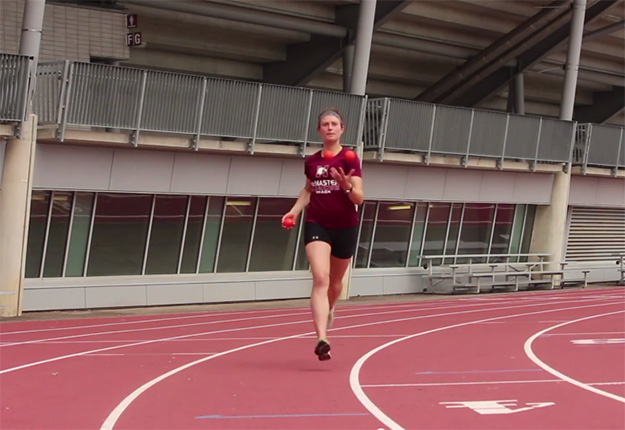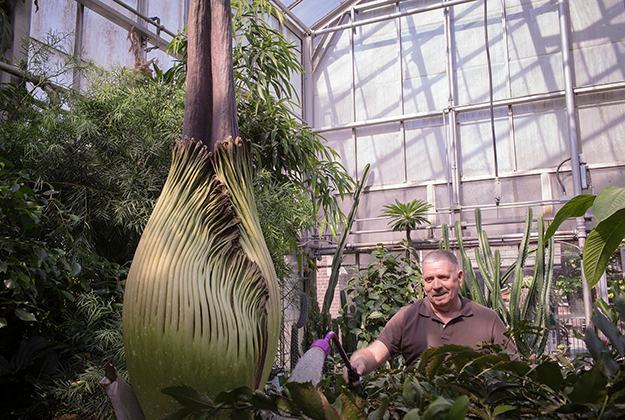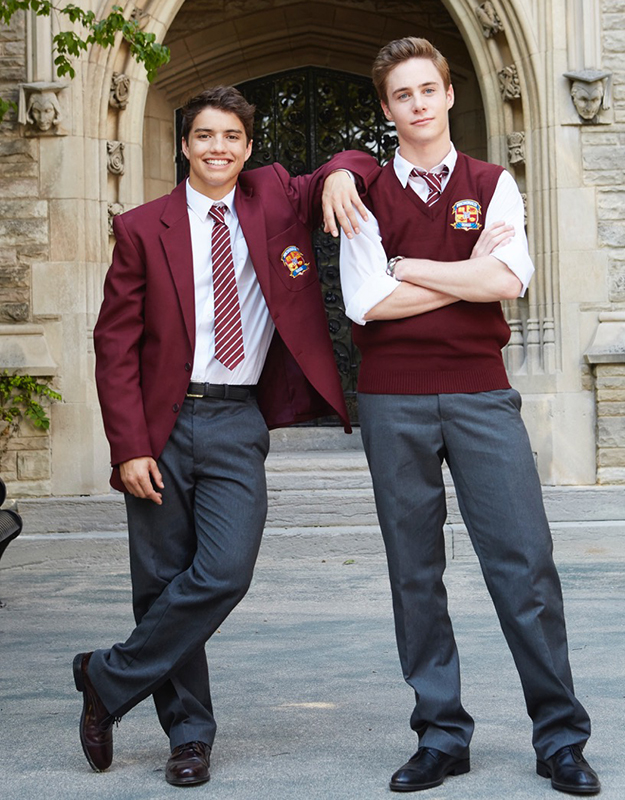15 things you missed at McMaster this summer

Eyes on the prize. PhD chemistry student Gabrielle Foran holds multiple world records in three-ball joggling, a unique sport that involves juggling three road hockey balls while running on a track. Joggling was just one of the many exciting activities taking place on campus this summer.
Feeling left out? Want to know what happened while you were away? Okay, we’ll tell you. From movie shoots on campus to world-class scientific advancements, here’s a list of 15 things you missed this summer.
Pan Am soccer athletes stay in Les Prince and Hedden Halls
More than 400 soccer players and officials from 12 different countries stayed on campus for the 2015 Pan Am Games. McMaster was buzzing with excitement, patriotism and multiple languages. Players stayed in Les Prince and Hedden Halls during their stay, and competed at Tim Hortons Field in the city’s east end.
Blooming of the rare corpse plant
The world’s smelliest plant, also known also as the amorphophallus titanum, bloomed in the McMaster Biology Greenhouse in June. The corpse plant is extremely rare, with only 200 documented flowerings around the world since 1886. McMaster has produced two plants in the last year.
Kathleen Wynne on campus to announce $1 billion towards Hamilton light rail
Ontario Premier Kathleen Wynne visited campus to make a big announcement. Wynne was at McMaster to announce $1 billion toward the construction of a new Hamilton light rail line that will run from McMaster University through downtown Hamilton to Queenston Circle. It is part of the largest infrastructure investment in Ontario’s history.
Running of the joggler
It wasn’t easy, but we caught up with Gabrielle Foran, joggling world record holder and PhD chemistry student. Foran, who can often be seen practicing on campus, explained to the Daily News how her sport combines running with juggling.
McMaster Women’s Choir won first place in national choral competition
After a tense wait behind the scenes, the McMaster Women’s Choir took a bow as champions of the National Competition for Canadian Amateur Choirs that aired on CBC Radio 2.
McMaster scientists partnered to produce world’s first cancer-fighting virus trials
A new type of cancer therapy was produced that uses a combination of two viruses to attack and kill cancer cells, and stimulate an anti-cancer immune response. Clinical trials were launched in early July by McMaster’s Dr. Brian Lichty, and the team partnered with others to develop the new therapy.
McMaster students win at AngelHack Toronto by developing lecture transcribing app
First-year computer science students Alyssia Jovellanos and Jonathan Boulanger partnered with Martin Ciesielski-Listwan, a first year engineering student from Western University, to develop ClassScribe. The app can transcribe audio lectures and also summarize them into notes, while listing and defining relevant terms. The group took home first place at AngelHack Toronto and are in the works to further develop the app.
Building of L.R Wilson Hall
Construction on L.R. Wilson Hall has been continuing and there have been lots of cranes on campus to prove it. The building will serve as McMaster’s home for the humanities and social sciences. The project was made possible through a $45.5-million investment from the province of Ontario and a $10-million gift from McMaster former Chancellor, L.R. Wilson.
Canada’s largest crane places a generator on the Health Science Building
Speaking of cranes, Canada’s largest stopped by the Health Sciences Building to place a 50-tonne generator on the roof of the building.
Go Jump in the Pool filmed on campus
“Macdonald Hall” might look a little familiar to you when you watch the movie adaptation of the book Go Jump in the Pool by Gordon Korman. Bruno and Boots played their pranks on McMaster’s main campus this summer while filming of the movie took place.
New Living Learning Centre announced
T-28 and T-29 were temporary after all. The University approved the building of a new Living Learning Centre in their place that will act as a residence and added study space. The new building will house 500 students and feature a dining hall and one level of underground parking.
McMaster scientists developed method to turn blood into neural cells
Led by Dr. Mick Bhatia from the Department of Biochemistry and Biomedical Sciences, the breakthrough allows cell scientists to convert human blood cells into both central and peripheral nervous system neutrons that are responsible for pain, temperature and itch perception.
Fitzhenry Studio opened
The Dr. Robert and Andrée Rhéaume Fitzhenry Studios and Atrium — the result of a $3M gift from alumnus Robert Fitzhenry, the largest ever donation to the Studio Art program — officially opened in early May. The studio added more than 1,700 square feet for classroom, studio and display space.
Opening of $84.6 M David Braley Health Sciences Centre
The new facility opened in early May, and has become the home for the Michael G. DeGroote School of Medicine’s Department of Family Medicine, as well as the City of Hamilton’s Public Health Services. Throughout the year, about 4,000 students will attend classes at the new facility and more than 54,000 visits will be made by 15,000 Hamiltonians without family doctor.
Demise of hitchBOT
The untimely end of the world’s only hitchhiking robot made international headlines earlier this month. hitchBOT was designed in part by McMaster researcher David Harris Smith as a social experiment. The robot traveled across Canada, Germany and Holland and was at the start of a US tour before the trip came to an abrupt end in Philadelphia.




